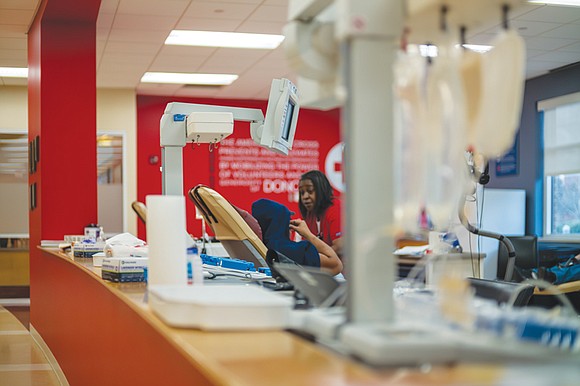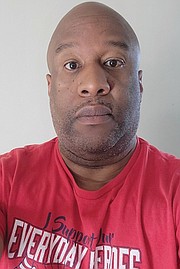An hour can save a life
More diverse blood donors needed amid emergency shortage nationwide
Debora Timms | 2/8/2024, 6 p.m.

National Blood Donor Month might have ended Jan. 31, but ongoing shortages in Virginia and nationally mean that the need for donors remains critical.
The January designation, first proclaimed by former President Richard Nixon in 1970, aims to raise awareness of the need for blood donations, especially during the winter months.
Jonathan McNamara, communications director for the American Red Cross, said in a recent telephone call that the number of people donating blood has dropped by 40% over the past two decades. Winter months can exacerbate shortages even further as bad weather and seasonal illnesses cause donors to cancel their appointments.
“The biggest shortfalls are for Type O blood, which is the most transfused type, and platelets which are always in demand because of their short shelf life,” he said. “But no matter your blood type, if you’re an eligible donor, the Red Cross needs your donation.”
He added that one in seven patients entering the hospital will need blood. In fact, someone in the U.S. will need a transfusion of blood and/or platelets every 2 seconds, yet only about 3% of age eligible people donate blood yearly.
Dr. Kimberley Sanford said VCU Health began using the American Red Cross about the time that she because director of transfusion medicine in 2012.
“We did not have enough blood to support our community,” she said in a recent video call. “The American Red Cross, with its national organization and ability to move blood nationally, was able to help the Richmond area.”
Each blood donation results in multiple blood products — red blood cells, plasma and cryoprecipitate, as well as platelets, which are obtained through a separate donation process known as apheresis. Patients who have suffered traumatic injuries, who are undergoing surgeries or who are being treated for medical conditions such as anemia, cancer or blood disorders might need blood transfusions as part of their treatment.
Both Dr. Sanford and Mr. McNamara stressed another important aspect in meeting the transfusion needs of patients — donor diversity.
While the race of blood donors and blood recipients does not typically matter, the blood types most people might be familiar with — A, B, O and AB — also must be matched by factors such as whether the blood is Rh-positive or Rh-negative.
There are actually more than 600 known antigens for red blood cells, Dr. Sanford said, some of which are unique to specific racial and ethnic groups. Ro is an Rh antigen, or haplotype, that is 10 times more likely to occur in individuals who are Black or of African descent.
This is especially important when transfusions are made to the more than 100,000 people in the United States with sickle cell disease, a condition that disproportionately affects those of African descent.
Matching blood-transfused to patients with rare blood disorders such as sickle cell disease reduces the risk of complications. One in three African-American blood donors are a match for people with sickle cell disease, but donation rates among communities of color tend to be lower for reasons such as medical mistrust, lack of access and lower donor eligibility.
These lower donation rates, combined with overall shortages, is why Dr. Sanford said VCU Health’s policy is to reserve donations from African-American donors for sickle cell patients.
Preston Page knows what it is like to live with sickle cell disease. He was diagnosed with the blood disorder as a 6-month-old. The New Jersey native moved to Virginia with his family at 12, and was often in and out of the hospital with pain crisis as a child. While this has gotten better for him as he has gotten older, he said adulthood often requires those with sickle cell disease to be “silent warriors.”
“Living with sickle cell is a challenging ordeal,” said the now 32-year-old who has resided in the Manchester neighborhood of Richmond for the past eight years.
“We have jobs, families and ambitions,” Mr. Page added. “We also have a daily obstacle to overcome to achieve those things.”
He often goes to work in pain and said he has had dozens of blood transfusions over the years.
Blood shortages and lack of donor diversity has doubled the impact, making it harder for blood recipients to get a match.
It is why last year Mr. Page became an advocate for the sickle cell community. He began sharing his story to inspire those with sickle cell disease, to encourage more diverse donor populations to give blood and to increase the pressure on legislators and pharmaceutical executives to do more to make medical treatments a more affordable, viable alternative for treatment.
The Red Cross and VCU Health also are involved in education and advocacy. They have formed partnerships with organizations such as the Sickle Cell Association, faith-based groups and high schools and colleges. In 2022, the American Red Cross introduced an HBCU Ambassador program that provides selected students with leadership and advocacy training and scholarship funds in return for a two-year commitment to increasing awareness of sickle cell disease and the need for donor diversity.
The program also hosts blood drives on HBCU campuses across the nation.
Even for those who cannot donate, there are still plenty of ways to show support. You can encourage family and friends to donate, be an advocate on social media, volunteer at a blood drive or host your own.
Jonathan Clarke, 53, organized a drive for the first time last year. The master firefighter worked with friends and colleagues to create a successful event, so this year Richmond Firefighters Local 995 and Brothers and Sisters Combined are doing it again.
Mr. Clarke, who was diagnosed with leukemia in May 2022, knows what it is like to be both a blood donor and a blood recipient. He received four blood transfusions between late 2022 and early 2023 and he said those who gave their blood saved his life.
“Before my diagnosis, I was going regularly to donate blood,” Mr. Clarke said. “Now I’m on the other side and thankful to be receiving help from someone just like me.
“You never know what the future holds, so give while can,” he added. “Tomorrow it may be your turn, or a loved one’s. We all need to help.”
The Richmond Firefighters Local 995 and Brothers and Sisters Combined blood drive in honor of Jonathan Clarke will take place at the Richmond Convention Center on Tuesday, Feb. 13, from 12:30 p.m. to 5:30 p.m. and on Wednesday, Feb. 14, from 8 a.m. to 1 p.m.
Appointments can be scheduled for this and other donation events near you at redcrossblood.org








